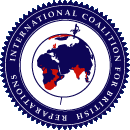Letter To The ICBR: Re: sharing reparations
ok, agreeabout reparations
Agreed about reparations ... but ... do not excise the usa from its intimate, albeit at times contentious, interweaving with the british imperial agenda ... willingly inherited and pursued by the usa as an inseparable unit in the anglosphere ...
But while the british empire dominated the second round of European imperial-colonial enterprise, it cannot be held solely accountable for the entire European agenda and action. Thus a broad across the board accounting of European imperial-colonial enterprises needs be made … including reparations, but in the form of debt relief and excising all interest accumulated or proposed to accumulate on any such loans or funds
contributed to development of former colonial territories.
Specifically toward the uk and british / English imperial drive, its
origins are against the Celtic Fringe – as Michael Hechter has well proven in his study of internal colonialism documenting the experiments of the English in brutally developing a colonial-imperial model, including the settler-colonial process displacing locals through ethnic cleansing and replacement by English or in the case of Ireland, Scottish settlers.
But what about this british empire, and its English core ethos of
expansionist imperial conquest, colonial settlement, rule and dominion? As Kevin Phillips so well documents, its roots are in the Anglo-Saxon ethos and ethnos, and especially prevalent and emergent within the fanatical protestant movement culminating internally in the excesses of Cromwellian rule, and its succession in the brutal continued subjugation of Ireland under William of Orange — King Billy’s fanatics, known today as Ulstermen
or Orangemen … so troublesome to a reunification of Ireland under a majority rule.
Yes, we must condemn excesses by the British empire, through its English, and ultimately protestant anglo-saxon ethno-ideological core. But where does the blame situate? With the house of Windsor, war of the roses or even Norman Barons of Magna Charta rules?
Where in this history do we divide England from France, with a hundred years war to settle claims by both ruling houses for territory inherited within the other’s domain? And the Dutch — caught between a Protestant alliance of Germanic states, including England, and the House of Hapsburg, as leader of an imperial force coalesced around the Roman Catholic counter-reformation embedded in the Spanish and Austro-Hungarian
territories.
Of minor mention to all except their victims, are the Belgian and Italian colonial enterprises, so brutal in their occupations and domination of local populations. Italian conquest, occupation, colonization and settlement of Libya, matched or exceeded norms of European settler-colonial brutality, while their subjugation of Ethiopia and Somalia were unholy enterprises of deploying aerial bombardment, artillery, and machine guns against spear and sword.
Of Belgium and the Congo we not only have Joseph Conrad’s novelistic accounts of European savagery amidst the heart of darkness, but a continuing saga through Katanga, and current genocide and ethnic cleansing in the Eastern regions spilling over among other artificially divided former colonies, reconfigured into dysfunctional post-colonial states of Uganda, Burundi, Rwanda, and other neighbours.
While taking the grand overview would not only condemn European enterprises, but include Russian imperial expansion into Western Turkistan, the Caucasus, Central Asia and Siberia, and also Chinese expansion and imperial colonial rule over Tibet, Mongolia, and Eastern Turkistan.
Irregardless of direct European imperial expansion, can we ignore the equally genocidal rise of its offshoots — the USA, Australia, or Israel?
Where to draw the line?
Is it sufficient to indict the UK as inheritor of the British Empire,
blaming it as a surrogate for all the others who profited through global genocidal rape of territories, peoples, resources?
To answer this question requires a collective discourse, indeed a
reconvening of a global peoples court to investigate and try those guilty for their crimes, yet leaving both verdict and punishment or recompence to the decision of such trials and juries representing the victims.
Yet, how can we indict the working classes and former peasants of European imperial powers? Can we not also indict feudalism of the ancien regime, or mercantilism and its even bloodier successor capitalism, and its present ruthless turbocharged capitalism under the tragically hypocritical banner of neo-liberalism?
These issues are too complex to either shunt aside or lay all the
accountability to the feet of the UK. A valid indictment must explore the evidence and context of the crimes as much as the intent and motivation of those accused as criminals.
Without similar resources to the anti-UK reparations movement — if indeed it is a movement and not merely a public relations ploy to sell a book and promote an author — a more just and necessarily extensive global tribunal (via internet) hardly seems possible unless the sponsors of the British Reparations websites would actively open the discourse to public debate over these issues.
Michael Hechter's (1976) history, Internal Colonialism: The Celtic Fringe in British National Development, 1536-1966,
Kevin Phillips’ The Cousins’ Wars: Religion, Politics, and the Triumph of Anglo America


